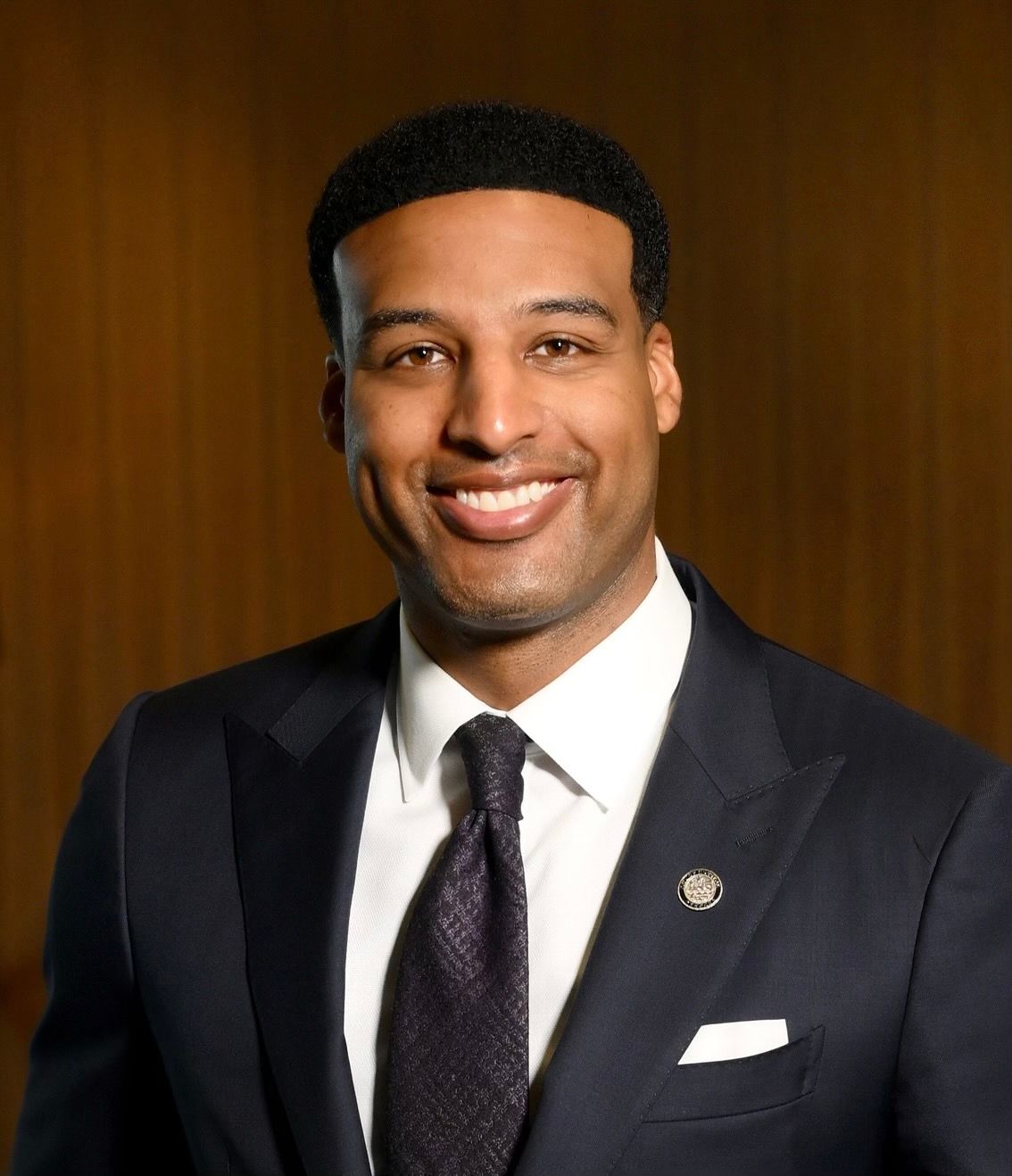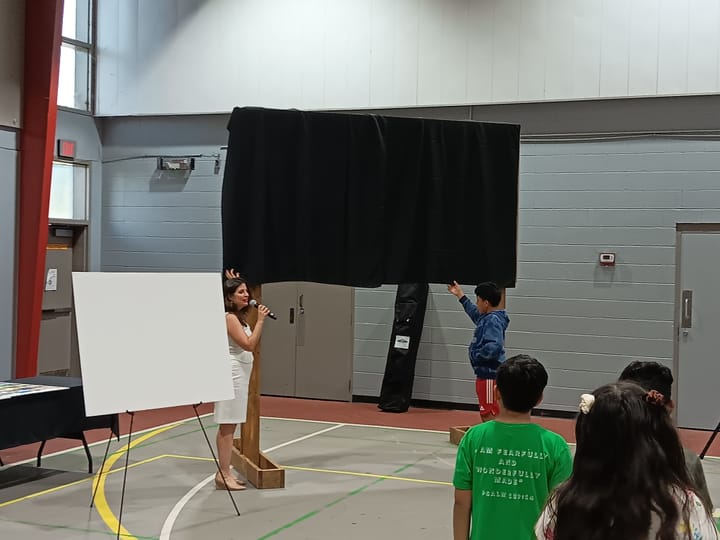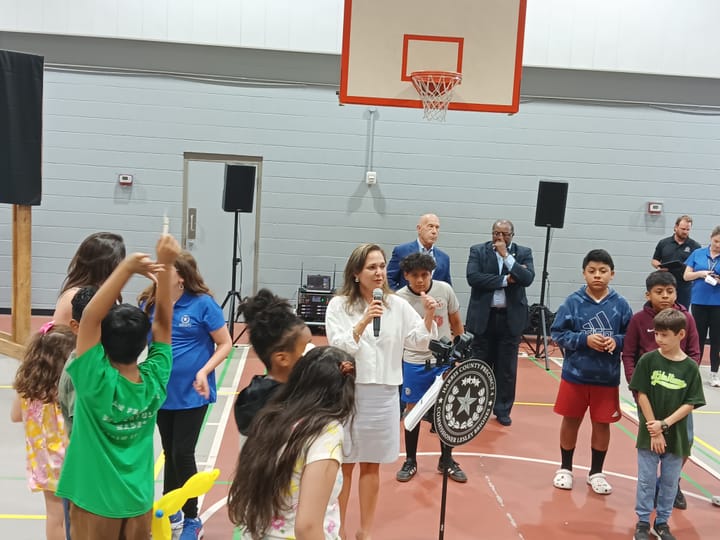Can Houston Subtract “the Track” from Bissonnet? Council Member Pollard’s Long-Term Ideas

The police blockade of Plainfield St. and Centre Pkwy is driving most prostitution away from the Bissonnet Track—but for how long? The blockade costs ~$1,400 per night in officer overtime to maintain, according to communication from the HPD Open Records Unit on June 9. At that rate, it would cost over half a million dollars to continue the blockade for one year.
But according to District J Council Member Edward Pollard, shutting down streets is not “the comprehensive approach.” Instead, it’s just “going to be one slice of the pie for the short term,” said Pollard at the Sharpstown Civic Association meeting on May 25.
That begs the question—what is the city’s long-term strategy? At his private law office in southwest Houston, we asked Council Member Pollard to elaborate on his statement. In a deep, firm voice, he explained a detailed set of ideas to fix the issue of prostitution on the Bissonnet Track.
Q: What is the idea for a long-term approach to the problem, since we probably can’t blockade the streets forever—or can we?
A: ...We want to look into, from a long-term approach, changing traffic patterns through urban design. So maybe the way we design those streets, maybe some of those streets are blocked off not by barricades or police officer vehicles, but they’re just blocked off through infrastructure.
The city of Houston received the largest federal grant for a single project in the entire state through Biden’s infrastructure bill, and that’s going to be a $30 million project for street improvement on Bissonnet from south Dairy Ashford to Hillcroft.
So as we get those dollars to flow in over the next year or two, and then some money from the city and also the county, the approach will be not just to rebuild the street from a pavement or upgrade standpoint, but “How can we utilize that money in an efficient and smart way to change traffic patterns…?”
Q: So would you consider making some kind of change to the streets so that those are permanently not “through streets” anymore?
A: Yeah.
Q (inserted later for clarity): Any other strategies?
A: We’re also looking at collaborating with community groups and non-profits on providing services, programs, and resources to women that may be trapped in that life, really working with different levels of agency from the local, state, and federal level on ways in which we can pursue the pimps…
If you look at that particular corridor, you have an elementary school, Betty Best, so we have Alief ISD—we have their police. We have Precinct 5 Constable Ted Heap. They patrol that area. You have METRO bus stops there. Many of the prostitutes sometimes find refuge in the shelters. So we have METRO PD. Then you also have Houston police. When you add all the agencies up, you can do a coordinated effort and strategy for patrol where you’re not just leaning on one department…
Of course, there are many more [strategies] that we talk about behind the scenes that [we] want to remain behind the scenes… You don’t want to put out all your information up front…
Q: You mentioned partnering with non-profits to help women out of that [life]. What kind of partnerships?
A: …There are several groups—one is called the Landing… The Mayor’s Office of Domestic Violence and Human Trafficking…collaborates with the non-profits… Let’s say those women need shelter, or those women need access to some type of program or service that the city provides or that the city has connections to—then we can try to streamline that for them. If there’s a way in which we need to give them protective care, then we can work with them…
So the non-profits really do the boots-on-the-ground, grassroots work to develop relationships with the women, try to understand their needs, build a relationship there and some type of rapport, [so] that when they’re ready for certain services, then the city can kick in and say, “Okay, we’re ready to receive you.”
Q: I’ve heard people asking, “What if they just go somewhere else?” What happens if they [the hookers] do move to another spot and that becomes the new Bissonnet Track?
A: I think it would be very difficult for them to move as a collective. Bissonnet is a known hub. People come from all over the country to make Bissonnet a place where they can find sex work, whether they’re the buyer or a seller.
Some of [the women] are still, I believe, attempting to push forward with that lifestyle, but they’re all over now. So you may find one or two on Westheimer. You may find one or two on Beechnut. You may find one or two that say, “Hey, we’re going to the north side.”
It’s easier now to address the issue when they’re few and a community doesn’t feel so overwhelmed, because on Bissonnet, people were feeling overwhelmed…
You’re never going to be able to stop crime altogether…this issue’s been going on since the beginning of time. The question is, how can we ensure that the people who live and work in that area don’t feel as if the problem is solely there, [as if] it’s so pervasive that it’s no end in sight? And so yes, will [the women] be creative and clever and try to find another way in which to do things? Yeah. But we’re not going to want them to just have free rein on one street. That’s not going to happen under my watch.
Q: I did notice, a few blocks west of the Bissonnet Track, there were about eight that I saw, but still, much lower numbers than before.
A: Like I said, will there be some displacement along it? Yeah. But like any other crime or issue, you try to make it hard on people to do that… We don’t want to make it convenient… Our hope is that you see how difficult it is and that you maybe change your mindset, and that when you do, the city is ready to receive you with programs [and] services because we want you to have a high quality of life. That would be my message to the women.
Q (inserted later for clarity): What about the johns?
[The women] can’t do anything without a buyer... There was a moment in time where we put up warning signs down Bissonnet last year that spoke to the increase from a misdemeanor to a felony for solicitation of a prostitute. [We] decided to keep a couple signs up in Spanish, but most of the signs come down over time just because it’s only meant to really be a warning. I don’t want to saturate a community with that type of message because I think that also brings down the quality of life for the residents if every single day they drive by and have to be reminded that this is an issue with a big orange sign… Now [the signs are] more scattered in strategic places that aren’t as in your face.
Q: Is the money to fund the overtime for the police officers coming from HPD’s budget or District J?
A: Combination. Primarily HPD… We saw an uptick in crime since COVID started and the federal government gave ARPA dollars… [The mayor has] been able to utilize some of those dollars to go toward the One Safe Houston program, which has various different tentacles, and one of those efforts now is the Bissonnet Track.
We have deleted filler words, removed other phrases and sentences for brevity (marked by "..."), and inserted or changed words for clarity (marked by "[ ]").




Comments ()